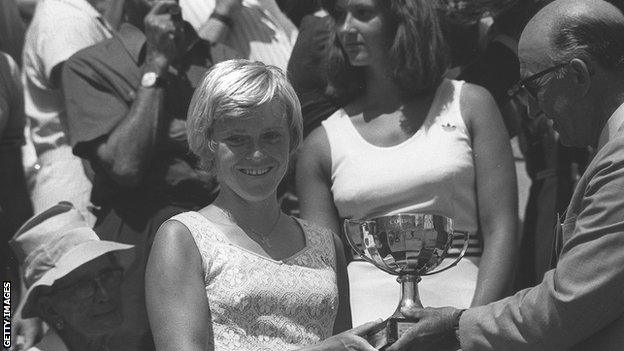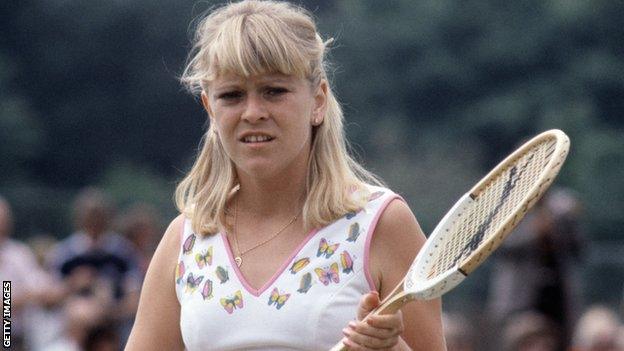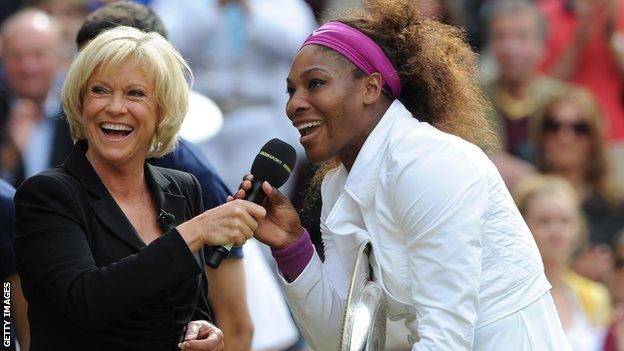Sue Barker: 'Our matches looked as if they were in the Stone Age' jokes BBC host
- Published

Sue Barker beat Czech player Renata Tomanova in the French Open final in 1976
Sue Barker laughs that the finals of the 1970s and early 1980s featured on the BBC's recent Wimbledon re-run series must have seemed "back in the Stone Age" to much of the audience.
"I was sitting at Wimbledon last week with Johanna Konta and Heather Watson," the BBC sports presenter told BBC Radio Ulster's Sportsound Extra Time.
"We were looking at matches through the seventies with Chrissie Evert and Martina Navratilova - the two players I played most against - and they were going 'oh… you've got white tennis balls and wooden rackets'.
"You suddenly think 'this looks dreadful… they must think we were awful' and even Chrissie Evert was asking if we could speed up her matches a bit."
But in truth, 1976 French Open champion Barker and her tennis friends have kept fans regally entertained over the past couple of weeks with the nightly doses of Wimbledon reminiscences.
'McEnroe loves bringing up my semi-final defeat'
Barker admits she will forever regret her failure to set up an all-British women's singles decider against Virginia Wade in 1977 when she slipped to a surprise semi-final defeat against Dutchwoman Betty Stove.
She said: "As soon as I had seen that Virginia had beaten Chrissie in the first semi-final, I suddenly thought 'I could win this'.

Barker missed out on the chance to set up an all-British women's singles final in 1977
"Growing up, I was always winning Wimbledon against my garage wall. I thought my dreams were about to come true and I started to make that dreadful mistake of starting to think about the final before I'd taken care of the semi-final. That was a harsh lesson learned.
"That was the one that got away and every Wimbledon I'm reminded of it. John McEnroe loves bringing it up."
That was the closest she came to landing the title at SW19, but Barker did have Grand Slam success with her 1976 French Open final triumph over Czech player Renata Tomanova.
Sue could rightly remind Superbrat of his heartbreaking failure to land the singles title at Roland Garros in 1984, when he lost a two-set lead in the final as his great rival Ivan Lendl claimed a first Grand Slam triumph.
Later in 1984, Barker's announcement of her retirement - aged 29, with an Achilles injury - immediately after her early exit at the Australian Open led to her receiving a message which sparked her successful broadcasting career.
"There was a whole load of messages after I got back to my hotel and I ended up sifting through them all and deciding which ones I was going to answer," she said.
"One of them was from a Gordon Bennett. I thought it was one of my friends playing a joke on me but Gordon Bennett happened to be the name of the man who ran Channel 7 Sport in Australia.
"If he had been 'John Smith' I wouldn't have bothered returning his message. But literally within two hours, I had got a job."

Barker, pictured here interviewing Serena Williams at Wimbledon in 2012
The initial tennis broadcasting role down under only lasted eight weeks but her appearances helped her land work with Sky Sports before she was signed by the BBC to cover Wimbledon for the first time alongside legendary broadcaster Harry Carpenter in 1993.
"I love my job," she said. "I've been lucky enough to have two great careers. The first one helped get the second one. I've had an absolute ball."
The 64-year-old's broadcasting career has seen her present Grandstand, the Olympic Games as well as becoming the popular host of A Question of Sport, whose latest run will begin filming next month.
Asked to compare her time on the court with the current era, Barker insists that she is delighted that she played when she did.
"Would I want to be playing now? Absolutely not," she said. "We had a blast when we were playing in the 1970s and '80s. We're still good friends today.
"I was doing this Zoom call with Martina at Wimbledon and we finished the interview and she said 'shall I give you a tour of the house, Sue?' and she goes all around her house showing me her exotic pets.
"Today it's business. They all have their entourages and they tend not to mix very much so I'm glad I'm got Chrissie and Martina and Virginia and others as friends. We were friendly rivals back then."